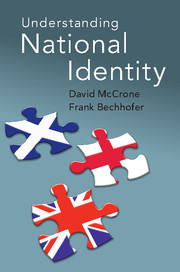Book contents
- Frontmatter
- Contents
- List of tables
- Preface
- Introduction
- 1 Thinking about national identity
- 2 Accessing national identity
- 3 National identity: do people care about it?
- 4 Debatable lands: national identities on the border
- 5 Claiming national identity
- 6 The politics of national identity
- 7 The notional other: ethnicity and national identity
- 8 A manner of speaking: the end of being British?
- 9 Whither national identity?
- Appendix National identity publications
- Bibliography
- Index
7 - The notional other: ethnicity and national identity
Published online by Cambridge University Press: 05 April 2015
- Frontmatter
- Contents
- List of tables
- Preface
- Introduction
- 1 Thinking about national identity
- 2 Accessing national identity
- 3 National identity: do people care about it?
- 4 Debatable lands: national identities on the border
- 5 Claiming national identity
- 6 The politics of national identity
- 7 The notional other: ethnicity and national identity
- 8 A manner of speaking: the end of being British?
- 9 Whither national identity?
- Appendix National identity publications
- Bibliography
- Index
Summary
All forms of social identity involve ‘othering’ the positing of a notional other against whom one compares the nature and strength of one's own identity. Often this involves ruling out who you are not. Of course people do not go about their daily interactions continually doing this explicitly but, as we shall see, where national identity is concerned they are aware of the process. As Reicher and Hopkins observe: ‘For Scottish identity, as indeed for any social identity, who we are depends upon who we compare ourselves to’ (2001: 30). It is a question of the vis-à-vis, a term which has no simple equivalent in the English language – ‘against’ is both far too strong and implies opposition or hostility. Most of the time, the ‘other’ is taken for granted and the comparisons are implicit rather than explicit, especially where there are imbalances of power or size. Thus, men are less likely than women to define themselves vis-à-vis the other sex; middle-class people vis-à-vis the working class, and so on. In terms of national identity, it would seem likely that the Scots, and the Welsh, and possibly the Irish, are intuitively presumed to define themselves vis-à-vis the English, and it similarly seems reasonable to imagine that the latter might define themselves vis-à-vis the French or Germans on the grounds that the ‘Celtic’ minnows are too small to be the salient and prime ‘other’. Only in the last few years have researchers rigorously investigated the processes of national identification in these islands rather than simply relying on such assumptions. One of the later tasks in this chapter will be to discuss the questions in the 2008/2009 British and Scottish Social Attitudes Surveys which we asked in order to address these issues.
- Type
- Chapter
- Information
- Understanding National Identity , pp. 141 - 163Publisher: Cambridge University PressPrint publication year: 2015



